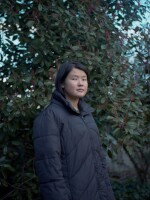For Indigenous people across the Gulf South, maintaining their cultural identity in a homeplace that is rapidly changing — even disappearing — due to climate change are among the biggest challenges they face.
A two-day event at Tulane University, which invites Indigenous people as well as academia to New Orleans, plans to touch on those topics impacting tribes in Louisiana and elsewhere during its 4th annual Tulane Gulf South Indigenous Studies Symposium. Featuring 11 sessions, it takes place starting at 8:30 a.m. and ends with a 5 p.m. evening reception on March 18 and 19 at the Kendall Cram Lecture Hall.
This year’s theme for the symposium is “Sassafras, Stickball and Stories: Indigenous Cultures of the Gulf South,” which aims to bring an awareness to the community about the “notion of ‘culture’ and the myriad of ways it is expressed and practiced in contemporary Native communities in the Gulf South” and that there is no one pan-Native experience, according to co-organizer and Tulane professor Laura Kelley.
“This is a unique conference in terms of being focused entirely on Indigenous issues of the Gulf South,” program committee member Jeffery Darensbourg, of the Alligator Band of the Atakapa-Ishak Nation, said in a press release. “In our era of dealing with climate change, pandemics and environmental destruction, the voices of Indigenous people represent a witness to other ways of living, surviving and thriving.”
The symposium will spotlight how culture and environment are intertwined. Kelley said that after Hurricane Ida, there is an urgency to bring attention to these issues to bring ideas and solutions forward to combat these crises communities are facing.
“Awareness has always been a mission, but I think Ida put it front and center showing how vulnerable some of these frontline communities are,” Kelley said.
Program committee member Lora Ann Chaisson is a member of the United Houma Nation. From Pointe-aux-Chenes, Chaisson has seen firsthand how Hurricane Ida has affected her home and community, the delays she’s seen in recovery and the destruction of the environment.
“The community — it’s so bad,” Chaisson said. “There's people that still don’t have a trailer from FEMA. I know that for a fact because this is my family.”

She will be speaking in a roundtable with other Indigenous people about traditional foodways. Chaisson points out how coastal erosion and saltwater intrusion have stunted palmetto plant growth and have limited the number of young cypress trees in the area, creating more splices in basket weave and limiting weaving material.
Chaisson is passionate about food and telling people where they come from, with Native staples like tomatoes to chocolate now incorporated worldwide.
“I think it's so important that people understand the contribution that our Indigenous people made to the world, not just here, but to the world,” Chaisson said.
More than 100 people are expected to attend the two-day event. Community members outside of academia are also invited to present their work, Kelley said.
“It’s one of the most exciting aspects to it, because it's not just academics talking about it. And it's not just looking backwards, which I think is a problem, especially in academia,” Kelley said.
The symposium also focuses on documenting and celebrating cultural activities across the Gulf South. Program Committee member Jason Lewis is a citizen of the Choctaw Nation of Oklahoma and currently lives and works in Mississippi.
He’s also a presenter for the symposium — tracking Choctaw stickball games occurring in the 1800s that are well documented by newspapers and other records. His work ties in how this history informs how culture and landscape are intertwined.
“I play stickball. And I'm just excited about having that connection with history. For example, one of the very first teams that I saw named in an article in 1845 is the team that I play for today. So for me, that's a deep connection,” Lewis said.
During the 1800s, when the Choctaw began being removed from their homelands, the documented games give insight to historical visibility and how these Choctaw communities negotiated space throughout their homelands while displaced.
Lewis said that these games received local coverage from the Times-Picayune, the Times-Democrat and even national media in Washington D.C.
The symposium also plans to bring opportunities directly to Native students, according to organizers. Kelley said there will be a campus tour, lunch and an information session for any Native American high school student and their family who would like to participate on Saturday.
Lewis said this is just a first step in connecting with the community here in the Gulf South. He hopes that in the future the symposium can build a more reciprocal relationship and buy-in from community members, with Saturday’s presentations focusing more on Native community members and roundtable discussions.
“That’s a barrier that I recognize exists between a private institution on our ancestral homelands and in a community where there's a lot of interest when it comes to academic research,” Lewis said. “Students at Tulane and the staff at Tulane who are Indigenous, they're very concerned with this symposium — what it represents and how it represents Indigenous peoples.”
For Indigenous students, the Tulane Office of Undergraduate Admissions will host a Tour and Informational Session for Indigenous Prospective Students and families from 10 a.m. to 4 p.m. on Saturday, March 19. Travel funds are available for interested families. For more information, email Angel Carter at acarte3@tulane.edu.
The two-day event is open to the public, in-person and will be streamed online, but registration is required. Register here.



